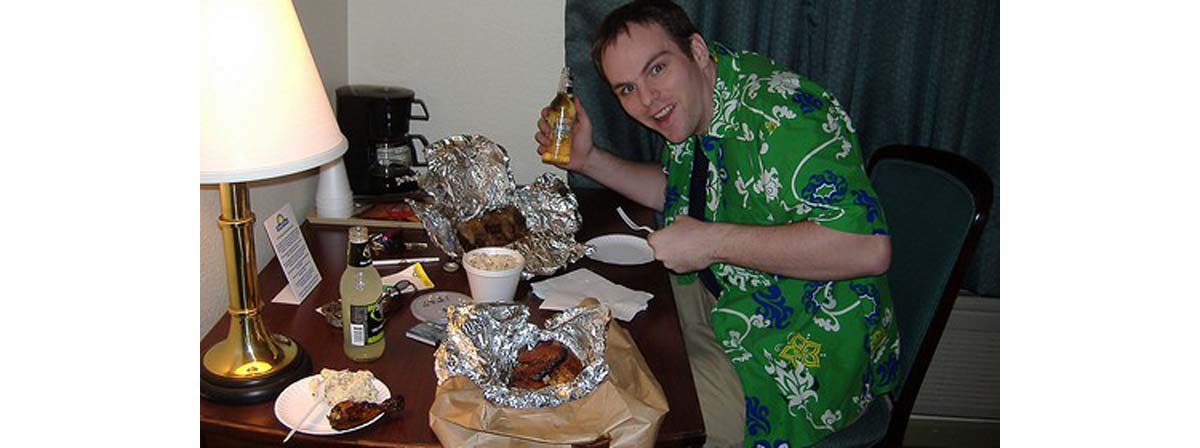"If your fat cells are yellin'," American TV's Dr. Oz is famous for saying, "the problem is ghrelin." Ghrelin is a hormone that the stomach releases to send a message to your brain that you are not full yet, and you need to eat more. When your stomach releases this hormone, you feel a literal, physical pain for food, until you eat a whole meal, and possibly eat some more.

Feed Me 'Til I Want No More
The reason the hormone ghrelin keeps us fat is that it acts on our brain in ways that make high-calorie foods look more attractive than low-calorie foods. Obesity researcher Tony Goldstone, MD, PhD, senior clinician scientist at MRC Clinical Sciences Centre at the Imperial College of London and Hammersmith Hospital, recruited a group of 18 normal-weight, young, healthy adult men and women to submit to MRI brain scans after overnight fasting followed by more fasting or a 730-calorie breakfast and a shot of either ghrelin or saline solution.
Goldstone found that whether the volunteers had eaten or not, and whether they had been given an injection of ghrelin or not, foods like carrot sticks and salad didn't "light up" the anterior orbital frontal cortex, the part of the brain involved in food-seeking behavior.
When the volunteers ate the breakfast and were given an injection of saline, high-calorie foods like pizza did not cause the brain to light up on MRI, either. But when the volunteers were not fed breakfast, or when they were fed the breakfast and given a shot of ghrelin, their brains lit up especially bright when they were shown photos of high-calorie foods.
Ghrelin resets the brain to direct food-seeking behaviors as if the stomach were empty, even when it's full. Ghrelin probably is responsible for causing people to engage in binge eating and compulsive eating behaviors. And some people are genetically programmed to create a double dose of this gotta'-eat chemical.
The Gene That Keeps You From Fitting In Your Jeans
Scientists have known since 2007. that the production of ghrelin is programmed by a gene called FTO. More recently, scientists have discovered that there are two versions of the gene that they label A and T. Everyone has two FTO genes. If you inherited the AA combination, you are 70 percent more likely to become obese than if you inherited the TT combination. You are genetically programmed to want to keep eating after you are full, in this case, and what's more, you are also genetically programmed to crave and eat high-calorie foods.
But what can you do about that?
What to Do When Ghrelin's Yellin'
If you are one of the unfortunate many who inherited two copies of the gene that keeps you hungry all the time, you don't have to be resigned to your fate to be fat. You will have to work much harder than most people to keep your appetite in check, but there are things you can do that will make your efforts more productive.
Here's a look at the steps you can take to eat less — and keep your calorie intake within normal levels — without feeling hungry all the time.

- Eat normally or don't eat at all. Many diet gurus give advice along the lines of "reduce your calorie intake but not too much" to help dieters deal with the reality that they will realistically get hungry when they are on diet, and they have to diet to lose weight. However, fasting for a short period, never more than 24 hours, but at least 12, is probably a better way to go. When you fast, that is, you don't eat anything at all, your stomach is going to send hunger signals, but you don't have to guess how much is too much, and you don't have the problem of "forgetting" a snack here or a second serving there. Fasting doesn't have to be complicated. Your first step is to avoid all eating after dinner. Then eat dinner earlier one day and have brunch instead of breakfast the next. That gives you just a little calorie restriction that enables weight loss, allows your body to reset and detoxify itself, and at least for a while, puts your fat cells in fat burning mode rather than fat storage mode. And 100% of the credit for your weight loss goes to you, not a diet.
- Eat foods that fill you up. When your stomach is full, you are less inclined to eat. You may still have an impulse to eat due to your stomach's overproduction of ghrelin, but you will have a competing feeling of fullness that counteracts that drive. What fills you up? You can eat salads and high-fiber foods, of course, but if you overdo them, you run a risk of going from full to bloated. A better approach is to include a cup or a bowl of slow-simmered soup at every meal. The fine particles in a slowly simmered soup take longer to digest, so your stomach stays fuller longer. University of Pennsylvania medical school professor Barbara Rolls has conducted over 100 studies on soup in weight loss diets. Typically, starting a meal with soup helps people feel full with 100 to 200 calories less food. Eating soup twice a day makes weight loss easier. No particular soup is better than any other; you certainly do not have to eat cabbage soup. Never forget to get enough protein, either, because without it, you will never feel satiated. While carbs may help some people feel full quickly, the effect wears off fast, too. If you struggle with overeating, protein becomes all the more important to you.
- Get at least six to seven hours of uninterrupted sleep every night. The brain "processes" ghrelin and a competing hormone called leptin during deep, uninterrupted sleep. If you don't get enough sleep, it will be very, very difficult for you to control your appetite.
- Practice "Out of sight, out of mind." Ghrelin makes high-calorie foods irresistible, so make sure you don't have access to high-calorie foods when you are dieting. Fast forward through fast food commercials when you watch TV, and keep the goodies locked in the cupboard where you can't see them.
- Karra E, O'Daly OG, Choudhury AI, Yousseif A, Millership S, Neary MT, Scott WR, Chandarana K, Manning S, Hess ME, Iwakura H, Akamizu T, Millet Q, Gelegen C, Drew ME, Rahman S, Emmanuel JJ, Williams SC, Rüther UU, Brüning JC, Withers DJ, Zelaya FO, Batterham RL. A link between FTO, ghrelin, and impaired brain food-cue responsivity. J Clin Invest. 2013 Aug 1. 123(8):3539-51. doi: 10.1172/JCI44403. Epub 2013 Jul 15.
- Schaeffer M, Langlet F, Lafont C, Molino F, Hodson DJ, Roux T, Lamarque L, Verdié P, Bourrier E, Dehouck B, Banères JL, Martinez J, Méry PF, Marie J, Trinquet E, Fehrentz JA, Prévot V, Mollard P. Rapid sensing of circulating ghrelin by hypothalamic appetite-modifying neurons. Proc Natl Acad Sci U S A. 2013 Jan 22. 110(4):1512-7. doi: 10.1073/pnas.1212137110. Epub 2013 Jan 7.
- Photo courtesy of weasello by Flickr : www.flickr.com/photos/weasello/2442172442/
- Photo courtesy of ihave3kids by Flickr : www.flickr.com/photos/9012854@N05/6094194935/


Your thoughts on this